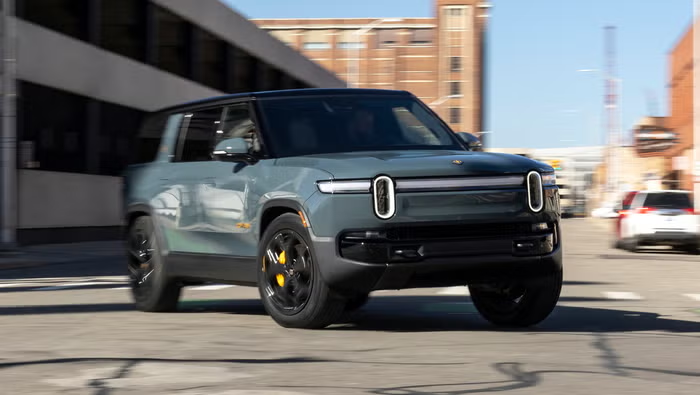In a groundbreaking development, Rivian and BYD have unveiled new battery technologies that promise to revolutionize the electric vehicle (EV) landscape. As the global shift towards sustainable transportation accelerates, these advancements could mark a pivotal moment for EV range and efficiency. Readers can expect a deep dive into how these innovations will impact the EV market, what sets them apart from existing technology, and practical insights on maximizing your EV experience.
The Future of EVs: Rivian and BYD’s Battery Innovations
Rivian’s Solid-State Breakthrough
Rivian has been making waves with its innovative electric trucks and SUVs, and its latest venture into solid-state battery technology is no less impressive. Solid-state batteries, which replace the liquid or gel electrolyte found in traditional lithium-ion batteries with a solid, promise several advantages:
- Higher Energy Density: Rivian’s solid-state batteries could potentially offer 50% more energy than conventional batteries, according to a recent report by MIT Technology Review.
- Faster Charging: These batteries support rapid charging, reducing downtime significantly—imagine recharging your vehicle in 15 minutes instead of hours.
- Improved Safety: The solid electrolyte reduces the risk of fires, a crucial safety advancement.
Rivian’s CEO, RJ Scaringe, stated in a Bloomberg Green interview that this technology could be ready for production by 2025, positioning Rivian at the forefront of EV innovation.
BYD’s Blade Battery: Safety and Longevity
Chinese automaker BYD has introduced the Blade Battery, a novel lithium iron phosphate (LFP) battery that sets new benchmarks in safety and durability. As reported by CleanTechnica, the Blade Battery offers:
- Enhanced Safety: The unique cell structure minimizes the risk of internal short circuits, making it one of the safest battery options on the market.
- Extended Life Cycle: With a lifespan of over 1 million kilometers, the Blade Battery is designed for longevity, reducing the need for frequent replacements.
- Cost-Effective: The use of LFP technology keeps costs down, making electric vehicles more accessible.
BYD’s Blade Battery has already been integrated into several models, with plans for broader adoption by 2024.
How These Advances Impact EV Range
Increased Driving Range
One of the most significant benefits of these battery technologies is the potential increase in driving range. Solid-state batteries and the Blade Battery could extend an EV’s range by up to 30%, addressing one of the biggest concerns for potential EV buyers—range anxiety.
- Rivian’s R1T Pickup: Expected to see a range increase from 314 miles to approximately 400 miles with the new batteries.
- BYD’s Han EV: Current range of 375 miles could see an improvement to over 450 miles.
Faster Charging Infrastructure
The ability to charge faster not only enhances convenience but also encourages the expansion of charging infrastructure. With more rapid charging capabilities, service stations can accommodate more vehicles, reducing wait times and making long-distance travel more feasible.
Practical Tips for Maximizing Battery Life
To get the most out of these cutting-edge batteries, consider the following recommendations:
- Regular Maintenance: Keep your EV well-maintained to ensure battery efficiency.
- Optimal Charging Practices: Avoid frequent full charges and discharges. Aim to keep the battery between 20-80% for optimal health.
- Temperature Management: Extreme temperatures can affect battery performance. Utilize built-in thermal management systems.
Where to Buy and What to Compare
With these advancements coming soon, consumers should stay informed about which models incorporate the latest battery technologies. Here’s a quick comparison guide:
- Rivian Models: Look for the R1T and R1S models, which are expected to include solid-state batteries in the coming years.
- BYD Models: The Han EV and the Tang SUV are already benefiting from the Blade Battery technology.
Comparison Factors:
– Price: Consider the initial cost versus long-term savings from reduced maintenance and better efficiency.
– Range: Evaluate how the increased range fits your driving habits.
– Safety Features: Look for enhanced safety measures that come with the new battery technologies.
Conclusion: A New Era for Electric Vehicles
The battery advancements by Rivian and BYD are indeed game-changers, not just for extending EV range but also for enhancing safety, charging speed, and overall vehicle efficiency. As these technologies become mainstream, the EV landscape is set for a transformation, making electric vehicles more appealing to a broader audience.
Are you excited about these technological leaps? How might they change your perception of electric vehicles? Share your thoughts and keep an eye on these trends as they unfold, promising a cleaner, more efficient future for transportation. As the world moves towards an era of sustainable mobility, Rivian and BYD are undoubtedly at the helm, steering us into a new age of electric innovation.

